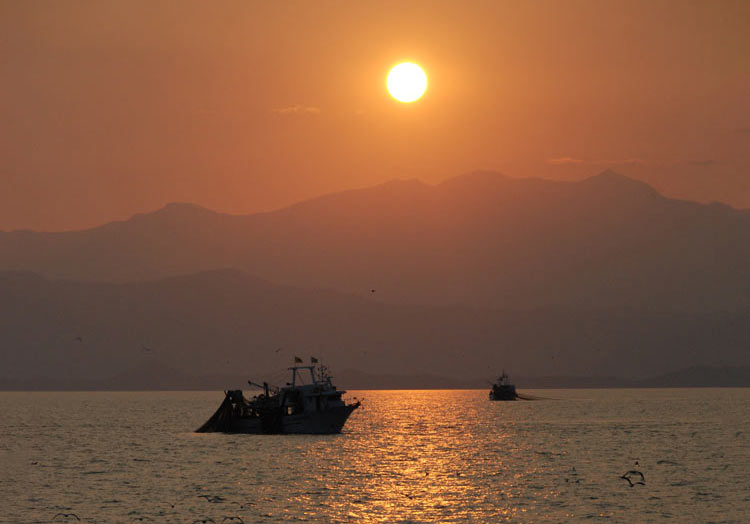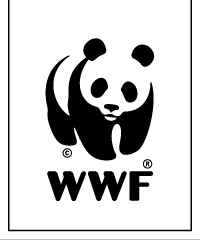93% of Mediterranean fish stocks are overfished.
Fish stocks (the term stock refers to the population of an exploited fish species) are being reduced globally. At a European level, two out of three fish stocks are overexploited, and species such as the Atlantic cod and the bluefin tuna have been overfished for decades. In the Mediterranean, which holds a negative record with 93% of its stocks overfished, 1.5 million tonnes of fish are caught every year, and 83% of tuna and swordfish catches are undersized (smaller than the allowed size).

© G. Paximadis / WWF Greece
Fishery products are the most important commodities worldwide, and 3 billion people around the world rely on them as a source of protein. In Greece specifically, fishing is one of the most important human activities, integrally intertwined with Greek society. Around 24,000 fishers operate in our country. Of them, 96.4% are engaged in coastal fishing, and their vessels operate in the coastal and island zones. Offshore fishing is practiced by either seiners or trawlers (with 600 of the roughly 16,000 vessels throughout Greece).
Our Work
For the purposes of the program “Sustainable Fisheries”, we work together with fishermen, the state, scientists, businesses and all the relevant stakeholders for the sustainable management of marine assets. It is very important to change the way we manage fisheries, in order for fish stocks to recover and guarantee healthy ecosystems for future generations.
Fisheries Improvement Project
Globally WWF is working in Fisheries Improvement Projects, in order to help fleets who want to improve their sustainability as well as retailers and consumers who are interested in sustainable products. The goal of such projects is that the involved fleet reaches the level of certification according to the principles of MSC (Marine Stewardship Council) and ideally receives certification.
The MSC is a global certification organization that measures the environmental record and the sustainability of fleets, according to the FAO criteria for responsible fisheries. Currently, there are 238 certified fleets all over the world (but none in the Mediterranean). The benefits for fishermen are the relative advantage that MSC provides with the certification of a fleet, but also the traceability of the fish as well as the communication and commercial profit that stems from all of the above, because of the increasing demand for sustainable products in the market.
In 2013, WWF Greece and AB Vasilopoulos (Delhaize group) together with the fishermen of the retail fisheries company “Manios” and the Fisheries Institute started the Fisheries Improvement Project for purse seiners in Kavala. This is the first such program in Greece and in the Mediterranean that aims at achieving sustainability for the purse seiners of Kavala that fish sardine and anchovy. This program is the result of a collaboration between WWF Greece and AB
Vasilopoulos that kicked off in 2011 and has at its core the evaluation of the fish that AB sources from and the development of a strategy for their sustainability.
Our goal is the creation of similar projects of sustainability of other fisheries in our country.
Common Fisheries Policy
The Common Fisheries Policy (CFP) provides EU member states with an institutional framework for fisheries management. In cooperation with the WWF European Policy Office in Brussels, the other WWF offices in the European Union and the WWF Smart Fishing Initiative, we work on a political level pushing for sustainable fishing in the Mediterranean and Europe, particularly with respect to issues such as the Illegal, Unreported and Unregulated Fishing and the implementation of the Mediterranean
Fisheries Regulation No 1967/2006.
The first revision of the CFP took place in 2002 and aimed primarily at ensuring the sustainable exploitation of fishing resources and a steady revenue for fisheries. The latest revision began in 2009 and is to be completed in 2013. In that context, WWF pushed for specific measures that would, among others, ensure healthy fish populations by 2020, establish long-term management plans and co-management. Unfortunately, despite the European Parliament’s efforts to take a step towards fish stock recovery, the decisions of the European ministers have condemned fish stocks and fisheries to a bleak future.
WWF Greece also sits on the Monitoring Committee of the Operational Programme for Fisheries (OPF), which is the national funding instrument of the European Fisheries Fund.
Share this



